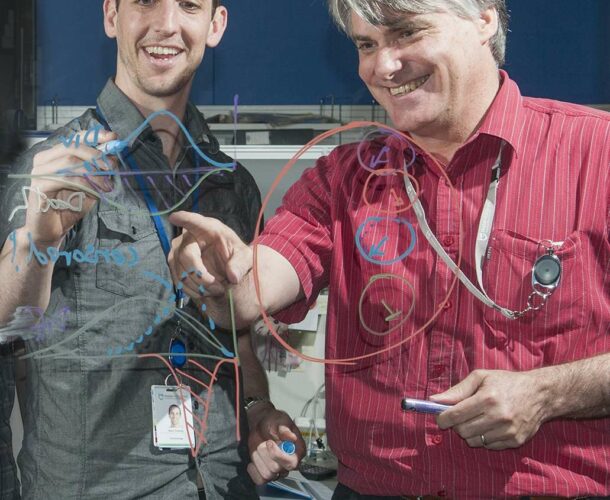In a major shake-up of scientists’ understanding of what determines the fate of cells, researchers at the Walter and Eliza Hall Institute show that cells have some control over their own destiny.
The commonly-held view was that a cell’s fate is determined by external cues such as the presence of particular hormones or cell signaling molecules. However the institute’s head of immunology, Professor Phil Hodgkin, and colleagues Dr Mark Dowling, Dr Cameron Wellard and Ms Jie Zhou, predicted that cell fates are, to a large extent, determined by internal processes.
Expanding models of immunology
In 2003 Mark Dowling, then an honours student in physics at the University of Queensland, attended a summer school in mathematics at Ormond College in Melbourne. While there, a fellow student introduced him to her boss, Professor Phil Hodgkin, head of the immunology division at the nearby Walter and Eliza Hall Institute.
Hodgkin explained that he was interested in expanding mathematical modelling in the institute’s immunology labs, and was looking to recruit mathematicians, physicists and computer scientists.
I could see that Phil had a lot of good ideas in biology but he didn’t have a maths background,” recalls Dr Dowling, 32, of the discussion that led him to conquer new disciplines — including a medical degree—with unnerving brilliance. “So in those early meetings we worked out a few answers to a few problems he’d been dealing with. And that’s why he encouraged me do a postdoc in his lab without me ever having studied immunology.
Getting his hands dirty
As for Dowling, the irresistible challenge was to apply the physicist’s love for “unifying principles, theories for everything in the universe” to molecular biology, a field conceptually defined by biologists’ fondness for “complexity and new phenomena.” Just as a set of mathematical equations can explain electromagnetism, Dowling tries to devise equations that can predict how cells respond to infection or other signals — insights that could help in the design of better vaccines and new therapies for autoimmune diseases.
So in 2007, with a PhD, a University Medal for academic excellence and a National Health and Medical Research Council fellowship under his belt, Dowling moved down from Queensland to get “his hands dirty” as postdoctoral researcher in Hodgkin’s lab.
It’s been a long struggle to learn enough about immunology to understand the questions that need to be asked,” Dowling says. And then Dowling had other questions about medicine and biology in general: “I saw lots of interesting problems in medicine but I didn’t know enough.” Naturally, he responded by embarking on a medical degree in 2009, continuing his postdoctoral research in the lab part-time.
Controlling their own destiny
When Dowling and his colleagues asked whether cells have some control of their own destiny, the findings merited publication in the international journal Science in 2012.
The researchers studied “naive B cells, cells that sit around waiting until the right infection comes along to become activated and make antibodies to fight infection.”
As these cells proliferate in the lymph nodes they can have multiple fates: die, divide, become an antibody-secreting cell or change what antibody they make. The institute team recreated the conditions required for B cells to develop into the different cell types and then filmed the cells, developing new technology and image analysis methods with the help of external experts. For three months, students working in the lab watched movies of 2500 cells dividing. Then Dowling and fellow researchers, assisted by a mathematician colleague from Ireland, Ken Duffy, crunched the data in search of patterns and probabilities.
Fate is not predetermined
They found the cells behaved as if an internal machine governed their fates— the outcomes differed even when the external signals, such as the presence of particular hormones or cell signaling, were the same.
It’s like a competition,” Dowling explains. “Each cell will in some sense set up a clock, or timer, that starts ticking for each of the outcomes— and then it’s a race, whatever clock goes off first is the decision the cell makes. The outcome is not predetermined. It might be that the body is tweaking the odds of producing particular cell types depending on the situation — and those odds will be different for different infections.
The results upended the commonly held view that a cell’s fate is determined by external cues.
Hodgkin’s notes that Dowling’s medical school coordinators were happy for him to continue research provided it didn’t interfere with his studies. No such danger: Dowling graduated in 2013, coming overall top of his cohort at The Royal Melbourne Hospital. Now he juggles a casual postdoc at the Walter and Eliza Hall Institute with a typically demanding residency at The Royal Melbourne Hospital.
He sees his future in clinical research. “But first finishing training in haematology or oncology would be ideal.”




